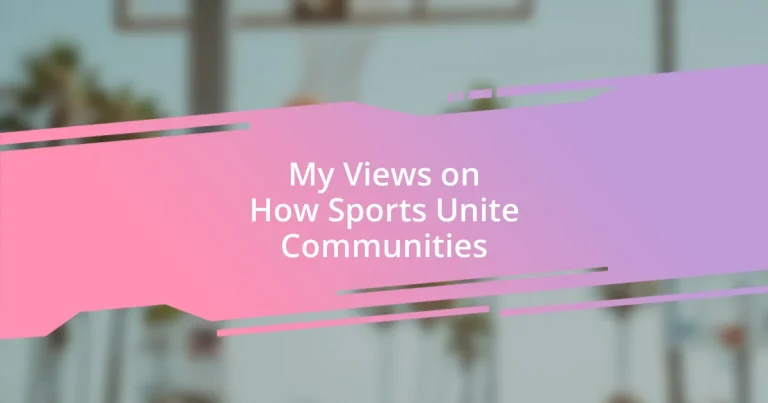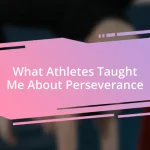Key takeaways:
- Sports unite communities by fostering social connections, promoting health, and enhancing local pride through shared experiences and celebrations.
- Inclusivity in sports encourages diverse participation and acceptance, breaking down barriers and creating lasting bonds among individuals from various backgrounds.
- Challenges such as access disparities and cultural misunderstandings can complicate community unity in sports, necessitating strategies like regular inclusive events and local business involvement to enhance engagement.

Understanding the role of sports
Sports serve as a powerful force that brings people together, transcending differences in age, background, and culture. I remember attending my local basketball games as a kid; the excitement in the air was palpable. Everyone, from the avid fans to the casual spectators, shared a common goal—rooting for our team. Isn’t it amazing how a simple game can forge connections?
The community experience is often built through the rituals surrounding sports events. For instance, I’ve seen families come together for tailgating before football games, creating memories over grilled burgers and spirited chants. These moments foster not just camaraderie but a sense of belonging. Have you ever felt that thrill of belonging to something bigger while celebrating a local victory?
Moreover, sports often serve as a platform for tackling social issues, uniting individuals for a cause. In my own town, I’ve watched how charity tournaments not only rallied athletes but also brought together local businesses and families to support the less fortunate. It’s heartwarming to see how a shared love for a sport can inspire collective action for change. How often do we see sports spark conversations that lead to community betterment?
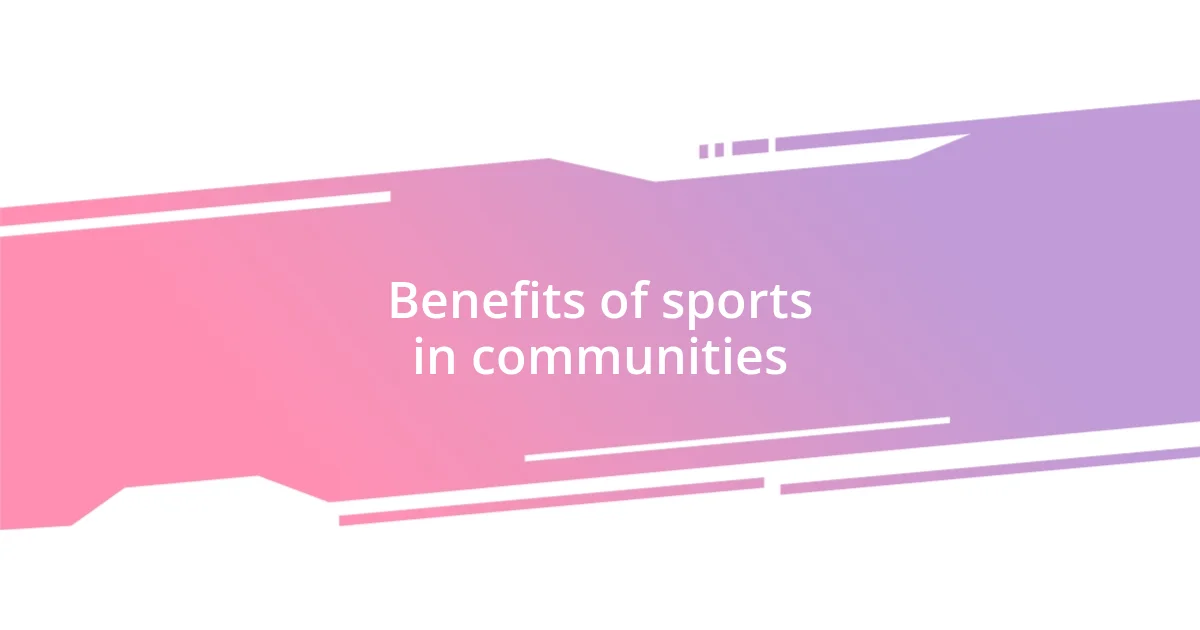
Benefits of sports in communities
Community sports programs offer a myriad of benefits that go beyond just recreational activity. From my own experience, a local soccer league not only provided a structured outlet for youth but also fostered friendships that lasted long after games ended. These relationships helped break down social barriers, showing me how a common interest in sports can lead to lasting connections between diverse groups. Isn’t it fascinating how a shared love for a game can turn strangers into friends?
Another significant advantage I’ve seen is the promotion of health and well-being. During a community running event I participated in, I noticed individuals of all fitness levels joined together with one goal: to support each other and celebrate personal achievements. The energy was infectious, and seeing people encourage one another was incredibly uplifting. Sports create a supportive atmosphere, reinforcing the importance of an active lifestyle while building a stronger community spirit.
Finally, sports initiatives often enhance local pride and identity. Reflecting on my high school’s basketball team’s championship win, the entire town came together in celebration. Local businesses thrived during this time, and we’re all still proud of our team’s achievements. When we rally around our athletes, it fosters a sense of unity and belonging that resonates throughout the community.
| Benefit | Description |
|---|---|
| Social Connections | Sports facilitate friendships and connections among diverse groups, breaking social barriers. |
| Health Promotion | Community sports encourage active lifestyles and support wellness through collective participation. |
| Local Pride | Successful sports teams can enhance community identity and boost morale, supporting local businesses. |
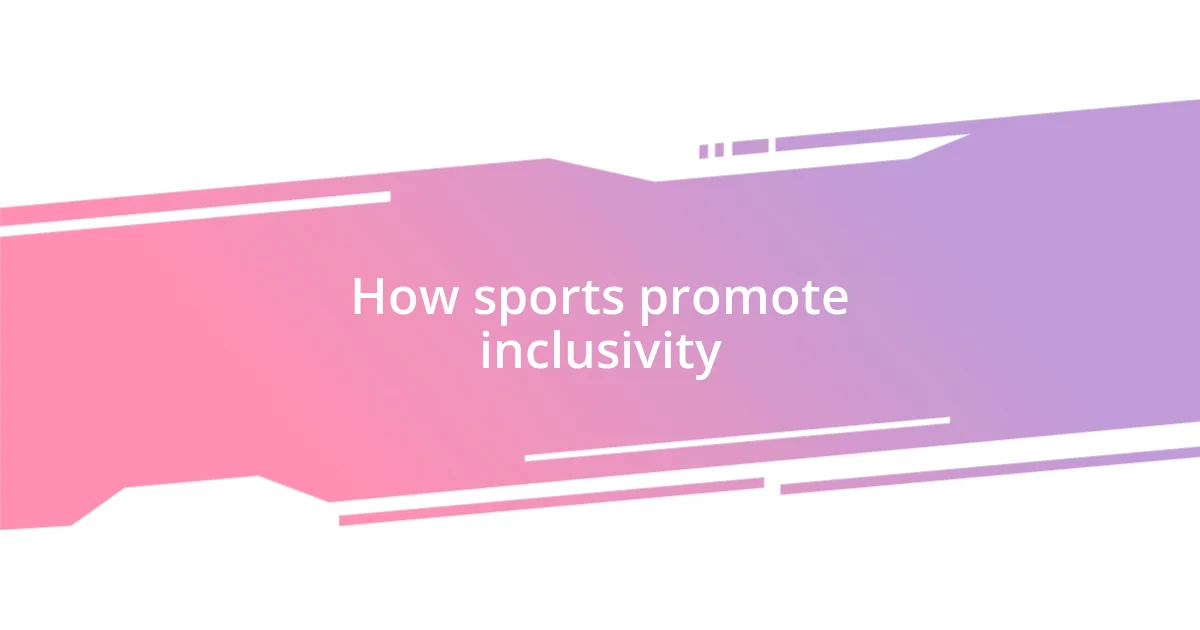
How sports promote inclusivity
Through my involvement in various community sports, I’ve witnessed first-hand how inclusivity emerges from shared experiences on the field. The overwhelming diversity in age, gender, and skill level during local events makes everyone feel welcome. I remember a touching moment at a neighborhood softball game when a young girl with a disability stepped up to bat. The entire crowd cheered her on, illustrating that sports truly are for everyone. It’s moments like these that showcase the beauty of sports in breaking down barriers and promoting acceptance.
- Diverse Participation: Sports events attract people from different walks of life, promoting understanding and acceptance across varied backgrounds.
- Unified Goals: Working together toward a common objective fosters a spirit of camaraderie, making everyone feel like part of the team.
- Celebration of Differences: Sports highlight unique strengths and talents, encouraging participants to embrace diversity rather than shy away from it.
The impact of inclusivity in sports goes beyond just participation; it creates lasting bonds. At one community event, I noticed a timid newcomer who hesitated to join a pickup basketball game. With a few friendly shouts of encouragement, she eventually took the court, laughing and smiling alongside seasoned players. It struck me how sports can break down reservations, teaching us to embrace new challenges in a supportive environment. This unique blend of teamwork and friendship often leads to richer social experiences both on and off the field.
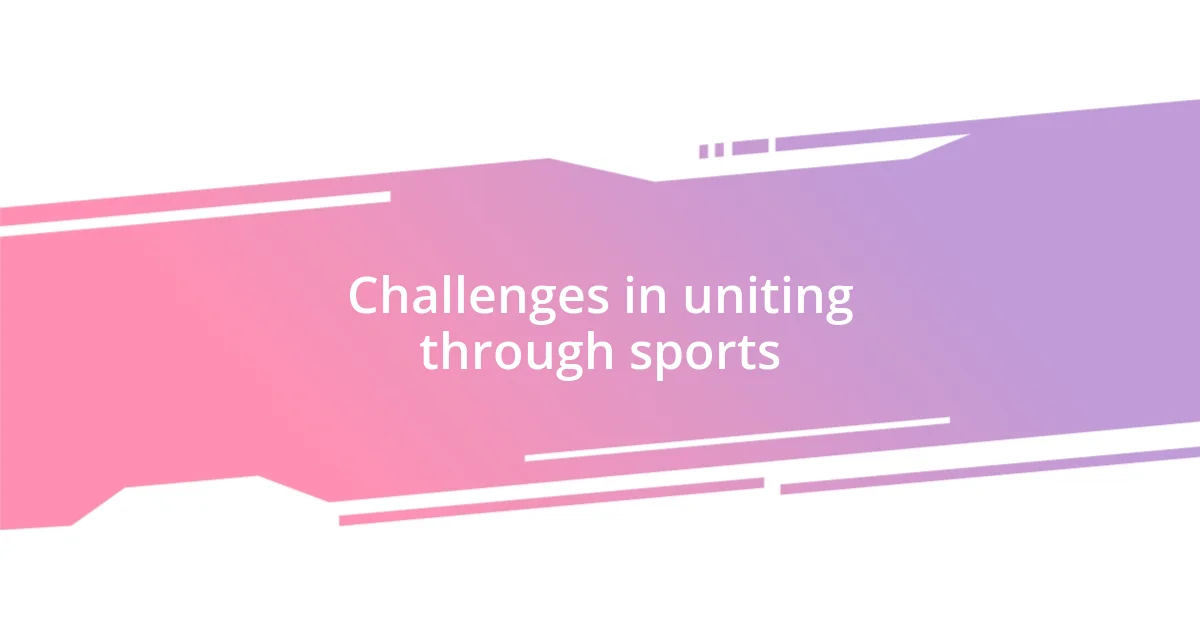
Challenges in uniting through sports
When it comes to uniting communities through sports, challenges can often emerge, complicating the very purpose of these activities. I remember a local rugby match that ended in a heated dispute, as differing opinions on referee calls divided the crowd. It made me realize how easily sports, which are meant to bring people together, can sometimes amplify existing conflicts instead. Isn’t it frustrating when something intended to unite leads to division?
Moreover, varying levels of access to sports resources can pose a significant barrier to participation. I saw this firsthand during a youth baseball camp, where some kids arrived in high-quality gear while others struggled with worn-out equipment. It was a stark reminder of how socioeconomic disparities can hinder equal participation, making it harder for everyone to feel like they truly belong. How can we foster a united community if not everyone is afforded the same opportunities to play?
Finally, I believe that cultural differences can also create misunderstandings in sports settings. I once participated in a community soccer event where some players had different notions of sportsmanship. What one group viewed as friendly banter, another saw as unsportsmanlike conduct. These clashes in perspective caused confusion and tension, underscoring how crucial it is to establish shared values before fostering unity through sports. Isn’t it vital to ensure that everyone understands and respects each other’s perspectives for true community bonding?
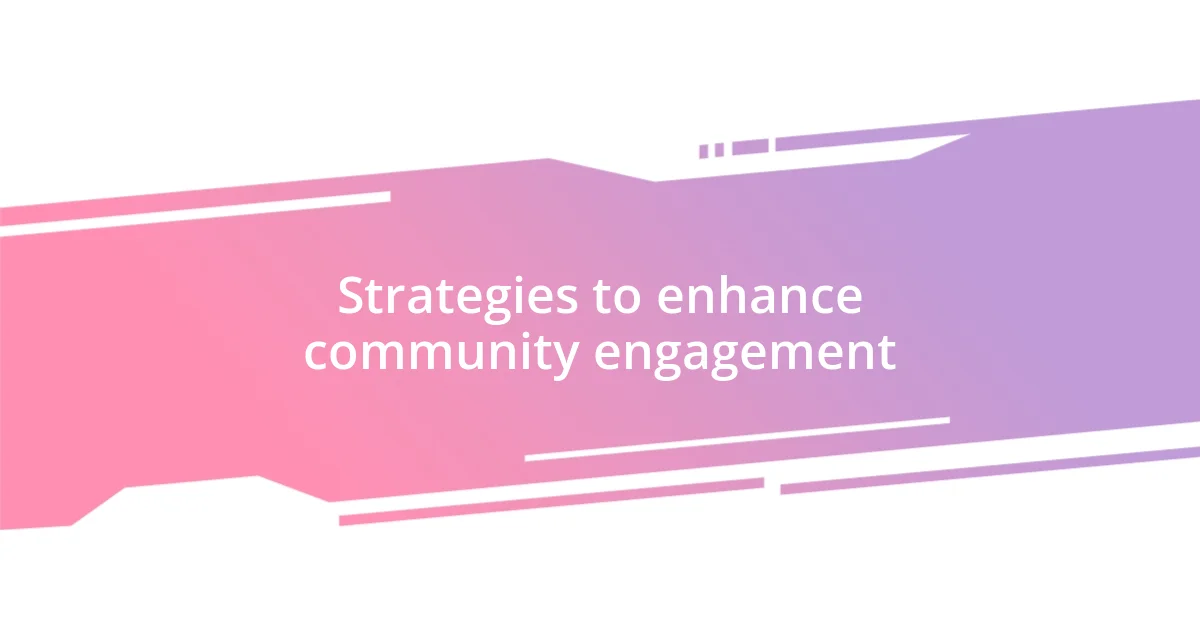
Strategies to enhance community engagement
To enhance community engagement through sports, organizing regular events that cater to various interests can be tremendously effective. I recall when our neighborhood held a family day filled with different sports, from tug-of-war to frisbee. It reminded me how engaging everyone, regardless of ability or age, can spark connections and create a shared sense of belonging. Have you ever seen a family compete together? The laughter and playful rivalry can turn strangers into friends!
Another strategy is to involve local businesses and organizations in community sports initiatives. At a recent community soccer tournament, I observed how sponsors stepped in with food trucks and merchandise booths, drawing larger crowds. This collaboration not only made the event more festive but also provided local businesses a chance to connect with residents. Isn’t it inspiring when everyone pitches in for a common purpose? It’s a win-win for everyone involved.
Creating mentorship programs within sports teams can also deepen community ties. I remember coaching a youth soccer team, where older players mentored younger ones. The look of pride on the young players’ faces as they learned something new was priceless. It’s incredible how these relationships foster trust and understanding across generations. Don’t you think having role models in sports can significantly impact community cohesion? It’s the kind of bond that lasts beyond the final whistle.












